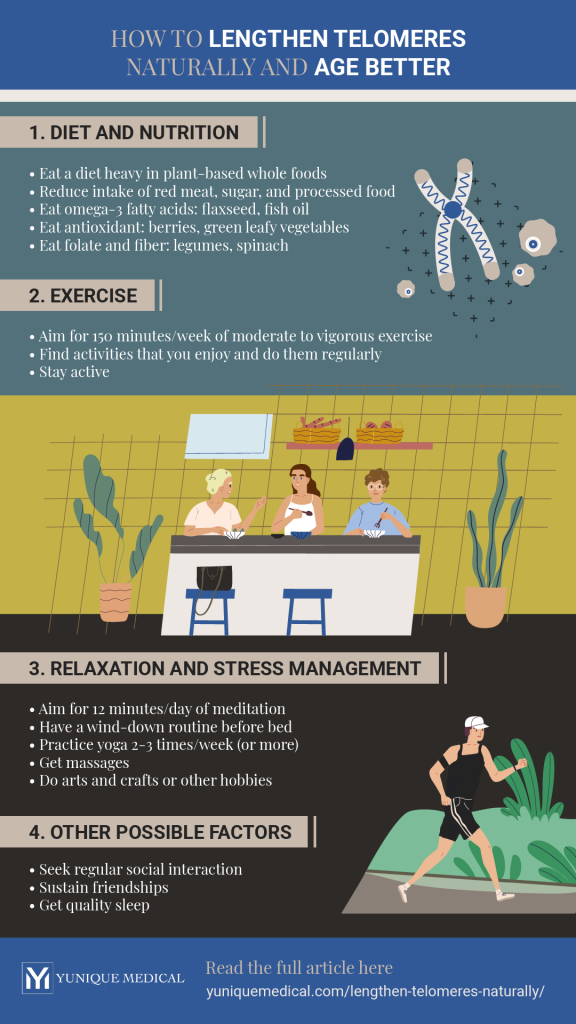Telomeres become shorter as we age. For this reason, they are a reliable marker of biological age and health. Find out how to lengthen telomeres naturally and slow down the aging process.
RELATED: Rapamycin: How To Slow Down The Way Our Cells Age
How to Lengthen Telomeres to Slow Down Aging
Telomeres and Aging
Telomeres are the caps on the end of human chromosomes. Like the caps on the end of shoelaces, these proteins protect the ends of DNA strands from shortening and fraying.
Scientists link longer telomeres to longevity, lower risk of disease, and better brain health.
Telomeres become shorter over time because aging cells can’t replicate correctly. As a result, cells lose the ability to function well, which speeds up the aging process.
Unfortunately, shorter telomeres are a part of aging. Additionally, inactivity, poor diet, and stress can cause your telomeres to deteriorate faster.
Luckily, you can strengthen your telomeres within a few weeks by making some lifestyle changes.
How to Lengthen Telomeres With Nutrients and Diet

Nutrition can have a significant impact on telomere length. A 2018 review found a link between consuming certain foods and longer telomere, including:
- Whole foods, whole grains, nuts, and legumes
- Fresh fruit and 100% fruit juice
- Vegetables
- Seaweed
- Dairy products
- Coffee
The review also notes that some nutrients may have an impact.
DNA synthesis, repair, and metabolism within the cell require folate. Which means folate may lengthen and protect telomeres. Additionally, antioxidant-rich diets that include vitamin C, E, polyphenols, and selenium, and fiber may benefit telomere length. Whereas, another study linked higher levels of omega-3 fatty acids to less inflammation and slower telomere decline.
Diet and eating patterns, however, may be as important as nutrient content.
For example, a western dietary pattern, consisting of more processed foods, red meat, and higher sugar content, may shorten telomeres.
On the other hand, a Mediterranean diet correlates with longer telomeres. Scientists think it’s the antioxidant and anti-inflammatory properties of this diet that preserve telomere length.
Some studies indicate fasting, and fasting-mimicking diets may benefit lifespan. But, we need more evidence to determine if and how it influences telomere length.
In short, here’s how to lengthen telomeres with your diet:
- Eat mostly plant-based whole foods.
- Reduce your intake of red meat, sugar, and refined, processed food.
- Consume omega-3 fatty acids, found in flaxseed, green leafy vegetables, and high-quality fish oil supplements.
- Include antioxidant-rich foods, such as berries, sweet potatoes, and green leafy vegetables.
- Add legumes, broccoli, spinach, and Brussel sprouts for folate and fiber.
How to Lengthen Telomeres With Exercise
By now, you know how vital exercise is to overall health. But, according to an NHANES study, physical activity has a significant influence on cellular aging as well.
More than 5000 adults participated in the three-year-long study, where researchers compared the effect of frequency, intensity, and duration of 62 activities.
The study concluded that adults with high activity levels had longer telomeres than those with low to moderate levels. Furthermore, they estimate the longer telomeres lowered biological age by seven to nine years.
Adults should aim for 150 minutes of moderate to vigorous exercise weekly to get all the benefits. Different types of exercises affect telomeres in different ways. So, a range of activities may have the most anti-aging benefits.
Find activities that you enjoy. For example, if hitting the gYunique is not your cup of tea, work in the garden instead. Alternatively, play team sports or go hiking.
Most importantly, stay active because any physical activity is better than none at all.
RELATED: How To Lean Out | Lose Stubborn Fat And Get Leaner
How to Lengthen Telomeres With Relaxation and Stress Reduction

Stress is detrimental to your health. Not only does it increase your risk of heart disease, but it lowers your immune system’s defenses and causes you to age faster.
Other mental health conditions, such as anxiety and depression, also play a significant role in telomere length.
Scientists think increased oxidative stress might be the reason why it shortens telomeres. Higher cortisol levels are another explanation because it inhibits the enzYuniquees that protect telomeres.
Whatever the reason, we know stress is harmful. We also know stress management has a significant impact on health. So, relaxation and stress reduction is vital to overall wellbeing.
There is evolving evidence that regular practice of yoga and meditation stabilizes telomeres, making it some of the best stress management methods available.
One study noted significant changes in participants’ biomarkers after three to six months of regular yoga practice. Similarly, those who practiced meditation had longer telomere length relative to a control group.
A different study measured the impact of yogic meditation on telomerase activity and mental health. Researchers found telomerase activity was 43% better, whereas mental health improved by 50%.
What is telomerase? Telomerase is a type of enzYuniquee that protects and extends telomeres.
Best of all, as little as 12 minutes of daily meditation may help support your telomeres, and you don’t need any special classes to meditate. Listen to a guided meditation or focus on your breathing for a set amount of time. For busy individuals, make meditation part of your bedtime routine.
If you’re new to yoga, it’s best to join a class to learn the ropes. Start by practicing yoga two or three times a week. Then work your way up to five or more sessions weekly.
Above all, you want to lower your stress levels. And while yoga and meditation are great, anything that helps you relax is beneficial to your wellbeing. Here are some more ways to relax and reduce stress:
- Arts, crafts, and hobbies
- Reading
- Listening to music or playing an instrument
- Gardening
- Hiking or spending time in nature
- Spa days and massages
*If you experience excessive stress, anxiety, or depression, speak to your doctor. Your doctor can prescribe the right course of action for your needs, which could drastically improve your daily life.
How to Lengthen Telomeres: Other Possible Factors
Various studies concluded diet, physical activity, and stress reduction influence telomeres. But, only a handful of studies have found other possible factors.
There is some evidence suggesting social interaction, friendship, and physical relationships may all play some part. These interactions may lower stress and therefore protect telomeres, but this theory still lacks proof.
Poor quality sleep may also shorten telomeres because it increases oxidative stress and inflammation. So, it stands to argue that better sleep equals longer telomeres.
Lastly, a study found a correlation between sitting at a desk all day and short telomeres. For this reason, it’s possible that spending more time on your feet may lengthen telomeres.
While these factors may influence telomere length, there isn’t enough evidence to support these theories yet.
Within weeks of making lifestyle changes, your telomeres may improve. Some of these changes require more effort than others. But, the sooner you start, the sooner you’ll get the benefits.

Why not start optimizing your health today? We can help slow down the aging process. Contact us for more information, and get started today! We have offices located in Ocala, Daytona, Fruitland Park, and Orlando, Florida and we are ready to help you get optimized.
UP NEXT:

